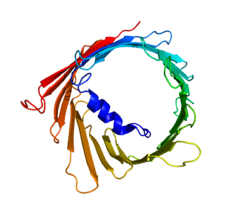Source: Lund University in Sweden Oct 26, 2018 7 years, 3 weeks, 5 days, 13 hours, 30 minutes ago
By blocking a protein, VDAC1, in the insulin-producing beta cells, it is possible to restore their normal function in case of type 2 diabetes. In preclinical experiments, the researchers behind a new study have also shown that it is possible to prevent the development of the disease. The findings are published in the scientific journal Cell Metabolism.
VDAC1 Protein
The researchers at Lund University in Sweden believe that the active substance, which inhibits the protein VDAC1, could play a part in future drug development for the treatment of type 2 diabetes.
"The goal is to be able to administer the substance to newly diagnosed type 2 diabetics to allow the insulin-producing beta cells to retain their function. Or, even better, to give it to pre-diabetics to prevent the onset of type 2 diabetes," says Associate Professor and research team leader Albert Salehi, who conducted the study together with Professor Claes Wollheim.
"It is a small study based on cell donations from six deceased people with type 2 diabetes, as well as a limited number of experiments in animal models. Further studies are needed to demonstrate how blocking VDAC1 affects kidney, heart, muscle and fat tissue, for example. However, the results thus far have been so promising that we have patented the use of the active substance within the diabetes field. We are very happy about that, and this initial study would not have been possible without the financial support from the Forget Foundation," says Albert Salehi.
On the cell surface instead of inside the cell
Pre-diabetics may experience elevated blood glucose levels for many years before developing type 2 diabetes. High glucose levels initiate a series of negative processes. Among other things, they increase the production of VDAC1, a so-called channel protein within the cells that, with the help of a substance, ATP, releases energy from the cell's power plants, the mitochondria, to other parts of the cell, to be used for insulin secretion.
At constant high levels of glucose, however, the levels of the VDAC1 protein increase, causing VDAC1 to attach also to the cell surface. The energy (ATP) then leaks out of the cell and causes cell death due to a lack of energy. This, in turn, leads to impaired blood glucose control that eventually causes organ complications, such as cardiovascular disease, kidney disease, blindness and stroke.
Normalised insulin secretion
When the researchers blocked VDAC1 in beta cells from organ donors with type 2 diabetes, the energy supply was restored and the insulin secretion was normalised.
The experiments were subsequently repeated on mice, which are known to develop genetically conditioned diabetes. As a result, the disease did not develop and the insulin production was maintained for five weeks, at which point the treatment was discontinued and the glucose levels increased. "It is a small study performed on cells from six deceased donors with type 2 diabetes as well as a limited number of experiments on animal models. Further studies are needed to demonstrate how blocking of VDAC1 affects tissues such as kidneys, heart muscles and fat. But pursuing the findings and performing the studies on humans requires more funding," says Albert Salehi.
New discoveries about metformin
In addition t
o specific VDAC1 antibodies and VDAC1 inhibitors obtained in collaboration with Israeli researchers, the researchers in Lund also used the
diabetes drug, metformin, and achieved the same effect.
"We have shown a whole new mechanism for how metformin works on beta cells. The fact that metformin not only works outside the pancreas but also protects the beta cells and improves insulin secretion in people with type 2 diabetes was recently demonstrated by a Canadian research team. The effect is probably achieved through an impact on VDAC1," says Albert Salehi.
Connection to Alzheimer's disease
There are connections between
type 2 diabetes, dementia and Alzheimer's disease. The authors of the study point out that there is also a link between VDAC1 and Alzheimer's disease, as high levels of VDAC1 can be found in brain cells in the parts of the brain that are affected at an early stage of the disease.
"We believe that the substance may have a good effect also on these patients by preventing the brain cells from dying and thereby improving the patients' cognitive abilities," says Albert Salehi.
Reference: Enming Zhang, Israa Mohammed Al-Amily, Sarheed Mohammed, Cheng Luan, Olof Asplund, Meftun Ahmed, Yingying Ye, Danya Ben-Hail, Arvind Soni, Neelanjan Vishnu, Pradeep Bompada, Yang De Marinis, Leif Groop, Varda Shoshan-Barmatz, Erik Renström, Claes B. Wollheim, Albert Salehi. Preserving Insulin Secretion in Diabetes by Inhibiting VDAC1 Overexpression and Surface Translocation in β Cells. Cell Metabolism, 2018; DOI: 10.1016/j.cmet.2018.09.008
